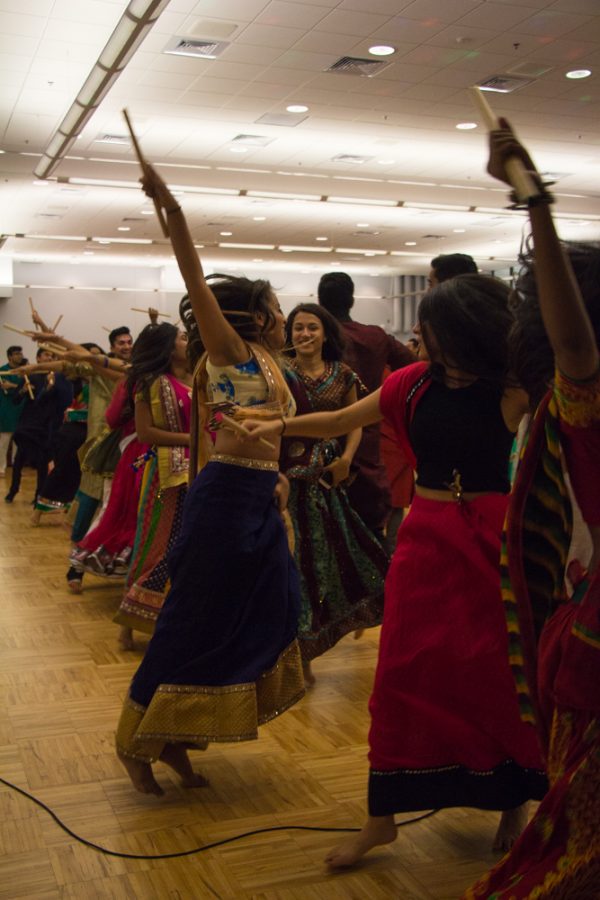Indian Student Association hosts Garba, Raas, Bhangra night at ARC
Students dance at the ISA Garba Raas Bhangra Cultural Event at the ARC on Saturday. Students performed Raas, a traditional Indian folk dance that is done in pairs while holding sticks called dandia.
Oct 17, 2017
A celebration of Indian culture, a display of vibrant traditional dresses and a night of lively dancing was featured at Indian Student Association’s Garba, Raas and Bhangra night Saturday.
This tricultural event took place at the ARC from 6-10 p.m., and was attended by many students ready to celebrate and learn a variety of Indian dance forms.
Aparajitha Adiraju, freshmen in Engineering, attended the event dressed in a colorful ghagra choli. This garb is customary to the northern states of India such as Gujarat, and is often worn to do the fast-paced, circular dance of Garba.
“I heard about it from friends,” Adiraju said. “I thought it would be exciting to go to it around this time since Diwali is next weekend. Also, I like dressing up.”
The night started with Garba, a dance form which originates from Gujarat, India. Performed around a central light and an idol, members spiraled around the decorated central table, clapping in unison and moving together fluidly to the rhythmic beat of the music.
Get The Daily Illini in your inbox!
Although many members originated from Gujarat and had prior knowledge of the elaborate dance form, people of other cultures were welcome to join in and learn the dance moves.
“We also tried to learn the Garba, even though it was hard,” Adiraju said.
With upbeat music playing, members collaborated to teach others something unique from their culture.
After Garba, the dancing continued, but in a new form called Raas. Raas, also called the “stick dance,” is featured during the Indian holiday Navratri. Attendees at the Indian Student Association’s event rushed to get a dandiya, a wooden stick which members strike with their partners as the music fastens.
For many, this dance form was a new learning experience as well. Nemah Afzal, freshmen in LAS, explained her experience, as she watched others rotate and switch partners gracefully.
Afzal said she is more into Bollywood dances, so Raas was a new territory for her. However, with help from friends, Afzal engaged in the playful dance, which requires careful attention and eye contact between partners.
The most energetic part of the night, however, was the finale: Bhangra.
Bhangra is a type of folk dance that originates from Punjab, a northern state of India. This dance is accompanied by festive music, with loud drums called dhols pumping up the crowd. At the event, a student played the dhol to popular Punjabi songs as students cheered and danced along.
“It was really fun. I enjoyed Bhangra the most since I didn’t know the other dances as well,” said Susie Lee, freshmen in Engineering.
Bhangra is a carefree dance and is popular for all occasions. Beginners can easily join in by simply bouncing their shoulders and jumping enthusiastically.
Some advanced Bhangra dancers showed off their moves, doing a one-legged bounce with a partner. This captivated the attention of many members as the dancers followed the beat of the drum.
Adiraju liked the Bhangra dancing at the end. She said it truly embodied the Indian celebration of imagination and charisma.
For many, this event was a reminder of home and the upcoming festivities. At a big college campus like the University, it can be difficult for students to connect to traditions and values they had at home.
“Sometimes it’s hard being Indian and being in college,” Adiraju said. “I know my family goes to Indian parties at home, and does many events for Diwali. It’s really nice to have that on campus here and to have people to connect with that you share the same holidays with.”
The event was a medium for others to explore a new culture and actively participate in it. It provided an opportunity to learn something new, whether if it is how to do a Garba step or how to bounce with full energy in Bhangra.
For Lee, the event reminded her of home and the things she does there. She said many of her “home” friends participated in events like these.
Afzal said what made this event fun and memorable was seeing a community of people coming together to celebrate a common culture and collaborating to learn new dances.
“It’s really cool. It makes me feel a part of a community that is more similar to mine,” Afzal said. “I have never been to an event like this. This was a lot of fun with the music and the people.”






